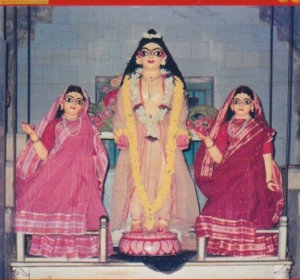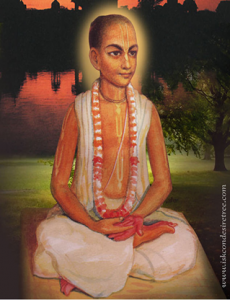Hare Krsna-Below we have 4 sequential purports from Srimad Bhagavatam where Srila Prabhupada explains the potency of serving and feeding the Brahmanas and Vaisnavas.
SB 4.21.37 purport… In addition to all these qualifications, when one fully engages in the transcendental loving service of the Lord, he becomes a Vaiṣṇava. Pṛthu Mahārāja warns his citizens who are actually engaged in the devotional service of the Lord to take care against offenses to the brāhmaṇas and Vaiṣṇavas. Offenses at their lotus feet are so destructive that even the descendants of Yadu who were born in the family of Lord Kṛṣṇa were destroyed due to offenses at their feet. The Supreme Personality of Godhead cannot tolerate any offense at the lotus feet of brāhmaṇas and Vaiṣṇavas. Sometimes, due to their powerful positions, princes or government servants neglect the position of brāhmaṇas and Vaiṣṇavas, not knowing that because of their offense they will be ruined..
SB 4.21.38 purport-The Supreme Person is described herein as brahmaṇya-deva. Brahmaṇya refers to the brāhmaṇas, the Vaiṣṇavas or the brahminical culture, and deva means “worshipable Lord.” Therefore unless one is on the transcendental platform of being a Vaiṣṇava or on the highest platform of material goodness (as a brāhmaṇa), he cannot appreciate the Supreme Personality of Godhead. In the lower stages of ignorance and passion, it is difficult to appreciate or understand the Supreme Lord. Therefore the Lord is described herein as the worshipable Deity for persons in brahminical and Vaiṣṇava culture.namo brahmaṇya-devāya go-brāhmaṇa-hitāya ca jagad-dhitāya kṛṣṇāya govindāya namo namaḥ (Viṣṇu Purāṇa 1.19.65)
Lord Kṛṣṇa, the Supreme Personality of Godhead, is the prime protector of brahminical culture and the cow. Without knowing and respecting these, one cannot realize the science of God, and without this knowledge, any welfare activities or humanitarian propaganda cannot be successful. The Lord is puruṣa, or the supreme enjoyer. Not only is He the enjoyer when He appears as a manifested incarnation, but He is the enjoyer since time immemorial, from the very beginning (purātanaḥ), and eternally (nityam). Yac-caraṇābhivandanāt: Pṛthu Mahārāja said that the Supreme Personality of Godhead attained this opulence of eternal fame simply by worshiping the lotus feet of the brāhmaṇas. In the Bhagavad-gītā it is said that the Lord does not need to work to achieve material gain. Since He is perpetually supremely perfect, He does not need to obtain anything, but still it is said that He obtained His opulences by worshiping the lotus feet of the brāhmaṇas. These are His exemplary actions. When Lord Śrī Kṛṣṇa was in Dvārakā, He offered His respects by bowing down at the lotus feet of Nārada. When Sudāmā Vipra came to His house, Lord Kṛṣṇa personally washed his feet and gave him a seat on His personal bed. Although He is the Supreme Personality of Godhead, Lord Śrī Kṛṣṇa offered His respects to Mahārāja Yudhiṣṭhira and Kuntī. The Lord’s exemplary behavior is to teach us.We should learn from His personal behavior how to give protection to the cow, how to cultivate brahminical qualities and how to respect the brāhmaṇas and the Vaiṣṇavas. The Lord says in Bhagavad-gītā (3.21), yad yad ācarati śreṣṭhas tat tad evetaro janaḥ: “If the leading personalities behave in a certain manner, others follow them automatically.” Who can be more of a leading personality than the Supreme Personality of Godhead, and whose behavior could be more exemplary? It is not that He needed to do all these things to acquire material gain, but all of these acts were performed just to teach us how to behave in this material world.
SB 4.21.39 purport...It is said that the Lord is most pleased when He sees one engage in the service of His devotee. He does not need any service from anyone because He is complete, but it is in our own interest to offer all kinds of services to the Supreme Personality of Godhead. These services can be offered to the Supreme Person not directly but through the service of brāhmaṇas and Vaiṣṇavas.Śrīla Narottama dāsa Ṭhākura sings, chāḍiyā vaiṣṇava-sevā nistāra pāyeche kebā, which means that unless one serves the Vaiṣṇavas and brāhmaṇas, one cannot get liberation from the material clutches.
SB 4.21.40 purport-In Bhagavad-gītā (2.65) it is said: prasāde sarva-duḥkhānāṁ hānir asyopajāyate.Unless one is self-satisfied, he cannot be free from the miserable conditions of material existence. Therefore it is essential to render service to the brāhmaṇas and Vaiṣṇavas to achieve the perfection of self-satisfaction. Śrīla Narottama dāsa Ṭhākura therefore says: tāṅdera caraṇa sevi bhakta-sane vāsa janame janame haya, ei abhilāṣa ..“Birth after birth I desire to serve the lotus feet of the ācāryas and live in a society of devotees.” A spiritual atmosphere can be maintained only by living in a society of devotees and by serving the orders of the ācāryas. The spiritual master is the best brāhmaṇa. At present, in the age of Kali, it is very difficult to render service to the brāhmaṇa-kula, or the brāhmaṇa class. The difficulty, according to the Varāha Purāṇa, is that demons, taking advantage of Kali-yuga, have taken birth in brāhmaṇa families. Rākṣasāḥ kalim āśritya jāyante brahma-yoniṣu (Varāha Purāṇa). In other words, in this age there are many so-called caste brāhmaṇas and caste Gosvāmīs who, taking advantage of the śāstra and of the innocence of people in general, claim to be brāhmaṇas and Vaiṣṇavas by hereditary right. One will not derive any benefit by rendering service to such false brāhmaṇa-kulas. One must therefore take shelter of a bona fide spiritual master and his associates and should also render service to them, for such activity will greatly help the neophyte in attaining full satisfaction. This has been very clearly explained by Śrīla Viśvanātha Cakravartī Ṭhākura in his explanation of the verse vyavasāyātmikā buddhir ekeha kuru-nandana (Bg. 2.41). By actually following the regulative principles of bhakti-yoga as recommended by Śrīla Narottama dāsa Ṭhākura, one can very quickly come to the transcendental platform of liberation, as explained in this verse (atyanta-śamam).
The particular use of the word anativelam (“without delay”) is very significant because simply by serving brāhmaṇas and Vaiṣṇavas one can get liberation. There is no need to undergo severe penances and austerities. The vivid example of this is Nārada Muni himself. In his previous birth, he was simply a maidservant’s son, but he got the opportunity to serve exalted brāhmaṇas and Vaiṣṇavas, and thus in his next life he not only became liberated, but became famous as the supreme spiritual master of the entire Vaiṣṇava disciplic succession. According to the Vedic system, therefore, it is customarily recommended that after performing a ritualistic ceremony, one should feed the brāhmaṇas.
SB 3.16.9 The Two Doorkeepers of Vaikuntha, Jaya and Vijaya
Vaisnavas to eat is also accepted by the Lord. But here it is said
that He accepts offerings to the mouths of brahmanas and Vaisnavas
with even greater relish. The best example of this is found in the
life of Advaita Prabhu in his dealings with Haridasa Thakura. Even
though Haridasa was born of a Muhammadan family, Advaita Prabhu
offered him the first dish of prasada after the performance of a
sacred fire ceremony. Haridasa Thakura informed him that he was born
of a Muhammadan family and asked why Advaita Prabhu was offering the
first dish to a Muhammadan instead of an elevated brahmana. Out of his
humbleness, Haridasa condemned himself a Muhammadan, but Advaita
Prabhu, being an experienced devotee, accepted him as a real brahmana.
Advaita Prabhu asserted that by offering the first dish to Haridasa
Thakura, he was getting the result of feeding one hundred thousand
brahmanas. The conclusion is that if one can feed a brahmana or
Vaisnava, it is better than performing hundreds of thousands of
sacrifices. In this age, therefore, it is recommended that harer
nama–chanting the holy name of God–and pleasing the Vaisnava are the
only means to elevate oneself to spiritual life.


